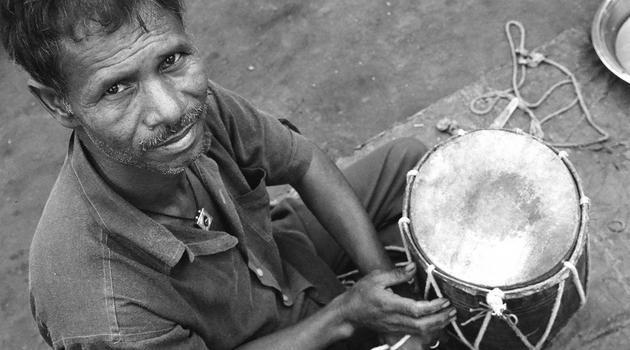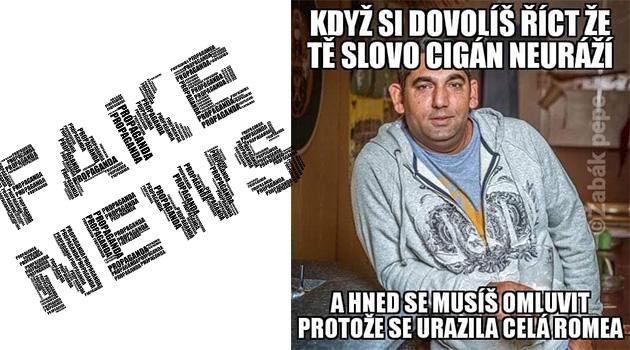First published in Czech on 23 March 2014.
“I don’t recognize Roma. I only recognize Gypsies. The Gypsies are the decent ones, the Roma are the inadaptable ones, to me!” – or how about: “Gypsies, or Roma, as they have begun calling themselves after the [1989] revolution…” – or how about: “My neighbors say they are Gypsies, they absolutely do not identify with the word Roma. I see no reason, therefore, why somebody shouldn’t be called that. Maybe some people want to believe they are better than everybody else!”
These are some of the most frequent things I hear when the subject of Romani people comes up in discussion. The range of people saying such things is very broad, from business people to manual laborers to teachers, people of all levels of education.
Why are the “Gypsies” calling themselves Roma now? Why have they “invented” such a thing?
Is it even true that they “invented” this term? During the First World Romani Congress, held near London in the year 1971, representatives of Romani people from different countries, including delegates from what was then Czechoslovakia, agreed that they would advocate for the use of “Rom” (and other minority autonyms such as Sinti, etc.) instead of “Gypsy”/”gypsy” and its variations.
The delegates did not just make that decision on a whim, and the word “Rom” certainly is not the outcome of a verbal football match while drinking in the pub, as many apparently believe. Romani people are believed to have originated in India, which the ancestors of the present-day Roma left at some time between the sixth and ninth centuries CE.
It is most likely that these people became separated from the caste group known under the denomination of “Dom“. On the basis of standard linguistic shifts that we can trace in the New Indo-Aryan languages, the pronunciation of that initial consonant (“D”) then changed to an initial “R”, while in some countries in the Middle East it changed to an initial “L”.
Whenever I speak with my Romani friends in their mother tongue, they use the word “Rom” to refer to themselves. I have never heard anybody speaking Romanes refer to themselves as “Gypsies”.
The appellation “Gypsy” does not exist in Romanes, which is a New Indo-Aryan language, the basic vocabulary of which is also of Indian origin. Where, then, did this word come from?
When Romani people, during their journey out of India to the West, entered the territory of what was then the Byzantine Empire, probably in the 11th century, they caused agitation because of their appearance and behavior (coming as they did from an absolutely different cultural environment). Not only was their appearance odd, they made their living by performing magic tricks and acts with trained animals, etc.
The Romani people reminded the Byzantines of the far-flung heretical sect called the Athinganoi and were often misidentified as such. From that mis-appellation, through gradual linguistic shifts, today’s forms of the word “Gypsy” developed (in German – Zigeuner, in French – Tsigane, in Slovak – Cigán, etc.).
From the beginning this term had a negative connotation. The Athinganoi sect had been scattered far and wide exactly because they were different, believing in magic and other activities the rulers were concerned about, and so the rulers forbade their subjects to come into contact with that sect (and later, from establishing relationships with Romani people) under the threat of various punishments.
The denomination of “Gypsy” later took on other strongly negative connotations. It is logical, therefore, that Romani educators then began advocating for the use of the designation for themselves that they have been using in their own language since time immemorial.
In the Czechoslovak context, the word “Rom” first officially appeared in the name of the organization that arose thanks to the Prague Spring in the year 1969, the Union of Gypsies-Roma (Svaz Cikánů-Romů). It was exactly such attempts by the Union’s agents to secure recognition for Romani people as a national minority (instead of the status of a social group of “backward” inhabitants, as the regime perceived them at the time) and their use of the term “Rom” that led to the Union being forcibly closed in 1973.
The Czech-language Internet is full of angry, chronic, endless discussions about the fact that some Romani people are daring to prefer the use of their own self-appellation, which is several centuries old. To us Czechs, these people have always been “Gypsies” (ideally written without capitalization because, after all, we do not perceive them to be a nation), so we see no reason to be politically correct and to use this allegedly artificial name of “Rom” (as our uninformed judgment tells us).
After all, everybody here ultimately knows that a “Rom” is just a “Gypsy”. This is indeed the case – each of knows that “Rom” = “Gypsy”, just as everybody knows that gay people are “fags”, Vietnamese people are “reeds” or “sticks” [rákosníci, větve], etc.
Does it seem appropriate to us, though, to label the Vietnamese with these epithets, or to write in the media about “fags” and “homos”? Who among us would actually use the label of “nigger” to refer to our African-American co-workers, or to any random visitor to Prague who has Black skin?
We often hear the excuse made that African-Americans call each other that name all the time. Or why, all of a sudden, are the “Eskimos” being called Inuits?
That change is because the Inuit perceive the term “Eskimo” to be very pejorative (it is reported to have originated either from an equivalent for a person who eats raw fish or for a producer of snowshoes). Moreover, it is a label that was given to them by people from outside their group, just as the Roma were given the appellation “Gypsy”.
For that reason, the Inuit prefer the term “Inuit”, which is what they call themselves. Sure, it is also true that many Romani people here also refer to themselves as “Gypsies” (Cikáni or Cigáni, the Slovak-language version, as most Roma in the Czech Republic originally came from Slovakia).
That is as it should be. Those people have the absolute right to call themselves whatever they want.
However, such people, unlike those who call themselves “Roma”, don’t call themselves this because they dare not declare themselves superior somehow, but because the label of “Gypsy” has become part of their everyday reality. The generation who grew up during the previous regime were not allowed to use the word “Rom” when they communicated with those around them.
It is, therefore, logical that some Romani people, when communicating in Czech, have internalized the appellation commonly used by the majority society and have adopted it as their own. Some Romani people use it because the non-Roma expect them to.
To refer to oneself other than as a “Gypsy” is suspicious to many here. Why, though, should we deny people their right to self-determination if this demonstrably pejorative label bothers them and they do not want to identify with it?
Is it for us Czechs to judge such feelings when we had to fight for our own national pride and self-determination, especially during the 19th century? Doesn’t our inability to accept the right of Romani people to self-determination indicate that it is we who are creating the problem here?
Doesn’t it demonstrate that it is we who are unwilling to accept and respect Romani people? Rather than this being about calling things by their correct names, or about rights in general, isn’t this even more about respect for our fellow human beings, about decent behavior and empathy?
I don’t know the answer. I have been thinking long and hard about this for some time, though.
P.S. A brief note to the know-it-alls who will get angry in the comments section and claim that Romani people consider the rest of us not to be human beings: “Rom” in Romanes means “member of the Romani nation”, while “rom” (without capitalization) means “Romani man” or “husband”. The term non-Roma (“Nerom“, which is considered correct usage by the Czech Language Institute) used here does not mean that the rest of us are not human beings. It means that we are not Roma. The neutral Romanes word “gadje” means the same thing.

